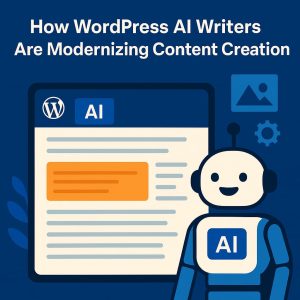 For years, content creation on WordPress meant hours of drafting, editing, and optimizing posts before hitting publish. That’s changing fast. With the rise of AI writing tools built directly into WordPress, such as the WordPress AI writer, creators are finding new ways to work smarter, not harder. These tools don’t just help with writing; they’re reshaping how blogs, websites, and online businesses operate.
For years, content creation on WordPress meant hours of drafting, editing, and optimizing posts before hitting publish. That’s changing fast. With the rise of AI writing tools built directly into WordPress, such as the WordPress AI writer, creators are finding new ways to work smarter, not harder. These tools don’t just help with writing; they’re reshaping how blogs, websites, and online businesses operate.
The Shift from Manual to Intelligent Writing
Traditional blogging involved a lot of repetitive work: brainstorming ideas, outlining, writing, optimizing for SEO, and managing tone consistency. AI writing assistants are changing that. In WordPress, plugins and integrations like Jetpack AI Assistant, Bertha AI, and other GPT-based tools have become part of the workflow. This means content creators can focus more on creativity and strategy, while AI handles the mechanical parts of writing.
Streamlining the Workflow
One of the biggest impacts of AI in WordPress is efficiency. Before AI, a typical post might take hours to write, edit, and optimize. Now, an AI writer can produce a well-structured draft almost instantly. Writers then refine and personalize the output, turning it into a polished piece much faster.
AI tools can also automate keyword research, SEO optimization, and internal linking. Plugins like Rank Math and Yoast SEO now integrate AI-powered suggestions to improve search visibility. This combination of automation and insight allows small teams or even solo bloggers to compete with large content operations.
Personalization at Scale
Over time, the AI learns what performs best, improving tone and relevance with each iteration. This level of customization used to require multiple writers or a dedicated content strategist. Now, AI can analyze engagement data, refine messaging, and adjust tone automatically. That helps brands maintain consistency across hundreds of pages without sounding robotic.
SEO and Readability Improvements
AI writers in WordPress are also changing how content is optimized for search engines. They can analyze top-performing content, identify keyword gaps, and generate optimized drafts that naturally include relevant terms.
Readability is another key area where AI shines. Tools can evaluate sentence structure, flow, and tone, suggesting edits to make writing more transparent and more engaging. For instance, an AI assistant might flag overly complex sentences, passive voice, or overused words, helping creators improve both user experience and SEO performance.
Enhancing Collaboration and Creativity
Some worry that AI will replace human writers, but what’s actually happening is collaboration. AI takes over the time-consuming parts of writing—research, outlining, and optimization—so humans can focus on creativity, storytelling, and strategy. It’s like having an intelligent writing partner built into WordPress.
Writers can use AI to brainstorm new ideas, explore different tones, or test variations of a headline. Editors can quickly assess a post’s readability or ensure consistency across multiple authors. And marketers can generate content calendars or campaign briefs without starting from scratch.
Accessibility and Inclusivity
AI writing tools are also making WordPress more accessible. Not everyone is a professional writer, but with AI assistance, anyone can produce high-quality content. Small businesses, nonprofits, and creators who once struggled with writing now have tools that guide them through the process.
For multilingual sites, AI translation and localization features are a huge benefit. Tools can instantly generate translations that maintain tone and nuance, helping websites reach global audiences without the cost of hiring translators.
The Ethics and Limitations
As with any technology, there are challenges. AI-generated content raises questions about originality, bias, and authenticity. Search engines like Google emphasize that AI-assisted content should still demonstrate human oversight and value. Simply generating content for quantity’s sake won’t work in the long term. The best results come when humans review, edit, and refine AI drafts to ensure accuracy and brand alignment. Transparency also matters. Some sites now disclose when AI has assisted in content creation to maintain trust with readers.
Looking Ahead: AI as a Standard Feature
AI isn’t a passing trend. WordPress itself is moving toward deeper AI integration. Future updates are expected to include native writing assistants, smart content templates, and AI-driven design tools that adapt layouts based on content type.
We’re moving toward a version of WordPress where AI doesn’t just write text but supports every stage of content creation, from ideation and research to design and distribution. Imagine uploading a topic and watching WordPress generate an optimized draft, suggest relevant images, and automatically schedule the post. That future isn’t far away.
Conclusion
AI writers are transforming WordPress from a simple publishing platform into an intelligent ecosystem for content creation. They save time, improve quality, and make professional-level writing accessible to everyone. But the real power lies in how creators use them, as partners that enhance creativity rather than replace it.
For bloggers, marketers, and businesses, embracing AI writing tools in WordPress isn’t about cutting corners. It’s about evolving with technology to produce smarter, faster, and more relevant content. The writers who learn to collaborate with AI will lead the next generation of digital storytelling.
